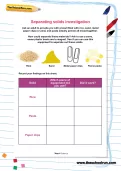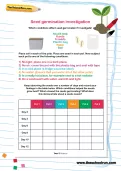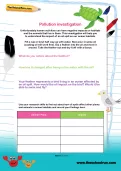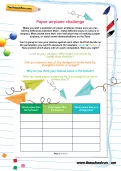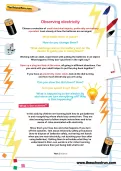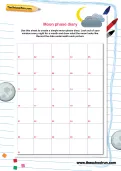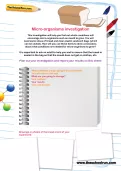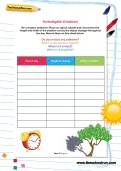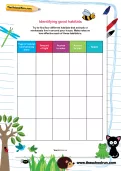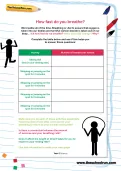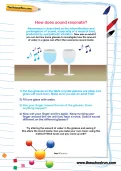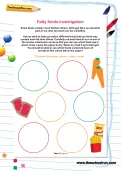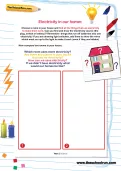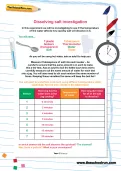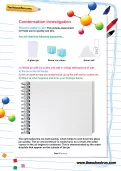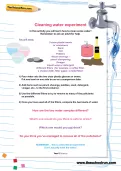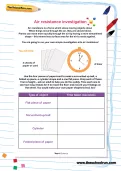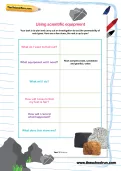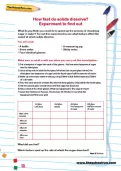Ask an adult to provide you with a bowl filled with rice, sand, metal paper clips (or pins) and pasta (ideally penne) all mixed together. How could separate these materials? Ask to use a sieve, some plastic bowls and a magnet. See if you can use this equipment to separate out these solids.
or
Register to add to your saved resources
Already a subscriber? to view this content.
Let's investigate which conditions affect seed germination!
or
Register to add to your saved resources
Unfortunately human activities can have negative impacts on habitats and the animals that live in them. This investigation will help you to understand the impact of an oil spill on our ocean habitats.
or
Register to add to your saved resources
Already a subscriber? to view this content.
Make yourself a selection of paper airplanes. You’re going to race your planes against each other, but first decide on the parameters you want to measure (for example, speed or distance). Now predict which plane will win each completion. Were you right?
or
Register to add to your saved resources
Already a subscriber? to view this content.
Choose a selection of small electrical objects, preferably two-battery operated. Look closely at how the batteries are arranged. Open up a plug and look at the wires, all going in different directions. Can you work with your adult helper to put the plug back together? If you have an electricity meter clock, look at the dial turning and how much electricity you are using.
or
Register to add to your saved resources
Already a subscriber? to view this content.
Use this sheet to create a simple moon phase diary. Look out of your window every night for a month and draw what the moon looks like. Record the date underneath each picture.
or
Register to add to your saved resources
This investigation will help you find out which conditions will encourage micro-organisms such as mould to grow.
or
Register to add to your saved resources
Already a subscriber? to view this content.
When we add some solids to water (or other liquids), they dissolve. Try this simple experiment to see which household solids will dissolve and which won’t.
or
Register to add to your saved resources
Already a subscriber? to view this content.
Be a shadow detective! Place an object outside and record how the height and width of the shadow cast by the object changes throughout the day. Record them on this sheet.
or
Register to add to your saved resources
Try to find four different habitats that animals or minibeasts live in around your house. Make notes on how effective each of these habitats is.
or
Register to add to your saved resources
Already a subscriber? to view this content.
We breathe all of the time. Breathing is vital to ensure that oxygen is taken into our bodies and harmful carbon dioxide is taken out of our body… but how fast do we breathe? When does this change? Why? Complete the table and see if this helps you to answer these questions.
or
Register to add to your saved resources
Already a subscriber? to view this content.
Resonance is described as the intensification and prolongation of sound, especially of a musical tone, produced by sympathetic vibration. Now ask an adult if you can borrow some glasses to investigate how the amount of water in a glass can affect the resonance sound made.
or
Register to add to your saved resources
Already a subscriber? to view this content.
Ask an adult to help you select different foods that you think may contain more fat than others. Carefully rub each food in turn in one of the circles. Label each circle so that you can see which food was in which circle. Leave the paper to dry. When dry hold it up to the light. You should be able to see which foods contained more oil and fat as this will be left on the paper!
or
Register to add to your saved resources
Already a subscriber? to view this content.
Choose a room in your house and find all the things that use electricity to make them work. Can you find and draw the electricity source (the plug, switch or battery)? Remember: things that run off batteries also use electricity! If you are drawing light switches, add lines to show the wires which must run up to the light to make it work (even if they are hidden)
or
Register to add to your saved resources
Already a subscriber? to view this content.
In this experiment we will be investigating to see if the temperature of the water affects how quickly salt will dissolve in it.
or
Register to add to your saved resources
Already a subscriber? to view this content.
There is water in air! This simple experiment will help you to quickly see this.
or
Register to add to your saved resources
Already a subscriber? to view this content.
In this activity you will learn how to clean some water!
or
Register to add to your saved resources
Air resistance is a force which slows moving objects down. When things move through the air, they are slowed down. Planes can move more quickly through the air by having a more streamlined shape – this means less surface area for the air to resist against. Do you fancy having a go at running your own simple investigation into air resistance?
or
Register to add to your saved resources
Already a subscriber? to view this content.
Use this worksheet to help your child plan an investigation into rock permeability.
or
Register to add to your saved resources
This activity encourages children to investigate at home which factors will make a difference to how fast a solid dissolves.
or
Register to add to your saved resources
Already a subscriber? to view this content.
